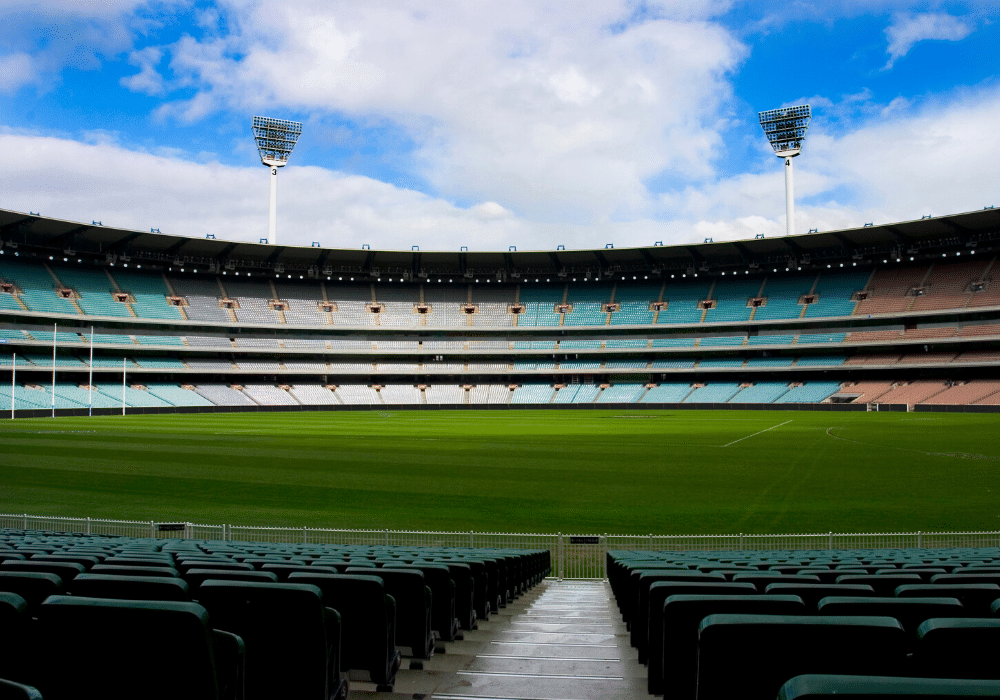Securing the Future of Sports and Entertainment
As COVID-19 restrictions ease in many areas around the country, the possibility of attending a sports game or live concert is becoming a reality. Traditionally seeing large numbers of patrons gathering in close proximity, such events have of course been identified as posing a risk of virus transmission.
Reopening the doors is only possible with significantly reduced crowds like we’re seeing in NSW, Queensland and SA and strictly enforced health screening, hygiene and social distancing measures.
The recent renewed lockdown in Melbourne is a stark reminder of how quickly things can change, as we continue to live with this pandemic. Whilst the task of providing live sports and entertainment in these times may seem difficult, we spoke to Josh Reeve, Security Risk Specialist and owner of Empire Protection, who believes that with correct planning and management, it is definitely possible to continue reopening and increasing crowd numbers, from a security perspective.
“Once inside a venue, social distancing will be reasonably easy to enforce by requiring patrons to be seated and controlling where they can sit. Managing entrance and exit points is going to pose the biggest challenge but there are a number of ways venue operators can overcome this.”
“Even if a sports stadium is only at 25% capacity, it will be impossible to manage social distancing if 5000 people turn up at once. Instead, venue operators will need to consider staggering entry times and gates, and doing the same when people leave.”
This would mean some ticket holders would be required to arrive much earlier than they are used to. However, with good communication and positive messaging, compliance will be easier to enforce.
“Rather than emphasise restrictions, venue operators should strive to make ticket-holders feel welcome. They could, for instance, offer additional entertainment for guests who arrive earlier as compensation for the inconvenience.”
“Communication is going to be key for managing expectations and delivering a positive experience. Ticket holders should be fully informed beforehand as to what is required of them, as well as providing reassurance about the contingency plans that are in place in the event of an outbreak, and what will happen if the event is cancelled or postponed.”
The other key measure to ensure successful implementation of social distancing hygiene and health screening measures will be having sufficient manpower on the ground.
“An adequate number of security personnel and venue ushers will be needed to make sure people do the right thing. The importance of good interpersonal skills should be emphasised when briefing staff – a friendly voice is going to achieve far greater positive results. Achieving voluntary compliance should be the primary aim of venue staff.”
Naturally, these steps are going to represent a significant drain on resources, so it will be important to take care that other security considerations do not suffer as a result. For instance, a perfectly planned entry and exit procedure could come undone in the event of an emergency.
“It won’t be sufficient if venues put all their effort into enforcing social distancing and then neglect to develop a robust emergency evacuation plan in line with COVID-19 and other safety guidelines.”
“If emergency evacuation isn’t planned with proper foresight, meaning large numbers of people are forced into a bottleneck, this not only risks virus transmission due to close contact but also produces other potentially dangerous situations. A large number of people forced into a small space could even present a soft target for terrorism.”
“Equally, problems like drinking and antisocial behaviour are not going to go away just because we are facing a new threat caused by the pandemic. Robust measures still need to be in place to mitigate these risks. Security plans will have to consider how bag checks can be carried out safely to prevent alcohol or weapons being smuggled in.”
Josh advises exercising caution and to consider starting with a smaller number of patrons at first, in order to assess the viability of risk mitigation and contingency plans.
All this may seem rather daunting to businesses who are struggling to survive under these difficult circumstances. However, it is important to keep looking at the bigger picture and not rush to recoup losses by letting too many people through the doors too soon.
“This is a marathon not a sprint. Just because a crowd of 20,000 might be allowed into a stadium, doesn’t mean you will be capable of managing these numbers. Venues will have to find a balance between providing entertainment and maintaining a safe environment that does not put patrons at risk.”
“When it comes to the experience of attending a live sporting or music event, crowd interaction plays an important role in creating the atmosphere. Enforced seating is not going to affect sports spectators as much as concert-goers. Therefore, concert venues may want to consider adapting their product offering so they can ride out the pandemic. Replacing rock bands with dance, classical music or opera would allow them to maintain a viable product that still provides a satisfactory level of entertainment for their guests.”
“How all this all plays out in the long term is going to come down to diligence. There is no room to cut corners, sufficient resources must be allocated to developing a robust security and risk mitigation plan, and paying for security consultants where necessary. Getting it wrong could make or break a venue, the risk isn’t worth it because it could affect the future sports and entertainment industries at large.”
The future may look uncertain but with creativity and foresight, we can ensure the survival of public entertainment without compromising on the safety of patrons.
To read more articles like this or to stay up to date with industry, subscribe to the Security Focus Newsletter and receive monthly updates.
-
Bring your security needs into focus
- Register

